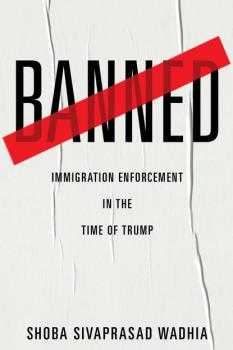ТОП просматриваемых книг сайта:
Shoba Sivaprasad Wadhia
Список книг автора Shoba Sivaprasad WadhiaАннотация
Examines immigration enforcement and discretion during the first eighteen months of the Trump administration Within days of taking office, President Donald J. Trump published or announced changes to immigration law and policy. These changes have profoundly shaken the lives and well-being of immigrants and their families, many of whom have been here for decades, and affected the work of the attorneys and advocates who represent or are themselves part of the immigrant community. Banned examines the tool of discretion, or the choice a government has to protect, detain, or deport immigrants, and describes how the Trump administration has wielded this tool in creating and executing its immigration policy.Banned combines personal interviews, immigration law, policy analysis, and case studies to answer the following questions: (1) what does immigration enforcement and discretion look like in the time of Trump? (2) who is affected by changes to immigration enforcement and discretion?; (3) how have individuals and families affected by immigration enforcement under President Trump changed their own perceptions about the future?; and (4) how do those informed about immigration enforcement and discretion describe the current state of affairs and perceive the future? Shoba Sivaprasad Wadhia pairs the contents of these interviews with a robust analysis of immigration enforcement and discretion during the first eighteen months of the Trump administration and offers recommendations for moving forward.The story of immigration and the role immigrants play in the United States is significant. The government has the tools to treat those seeking admission, refuge, or opportunity in the United States humanely. Banned offers a passionate reminder of the responsibility we all have to protect America’s identity as a nation of immigrants.
Аннотация
The first book to comprehensively describe the history, theory, and application of prosecutorial discretion in immigration law [b][/b]When Beatles star John Lennon faced deportation from the U.S. in the 1970s, his lawyer Leon Wildes made a groundbreaking argument. He argued that Lennon should be granted “nonpriority” status pursuant to INS’s (now DHS’s) policy of prosecutorial discretion. In U.S. immigration law, the agency exercises prosecutorial discretion favorably when it refrains from enforcing the full scope of immigration law. A prosecutorial discretion grant is important to an agency seeking to focus its priorities on the “truly dangerous” in order to conserve resources and to bring compassion into immigration enforcement. The Lennon case marked the first moment that the immigration agency’s prosecutorial discretion policy became public knowledge. Today, the concept of prosecutorial discretion is more widely known in light of the Obama Administration’s Deferred Action for Childhood Arrivals or DACA program, a record number of deportations and a stalemate in Congress to move immigration reform. Beyond Deportation is the first book to comprehensively describe the history, theory, and application of prosecutorial discretion in immigration law. It provides a rich history of the role of prosecutorial discretion in the immigration system and unveils the powerful role it plays in protecting individuals from deportation and saving the government resources. Shoba Sivaprasad Wadhia draws on her years of experience as an immigration attorney, policy leader, and law professor to advocate for a bolder standard on prosecutorial discretion, greater mechanisms for accountability when such standards are ignored, improved transparency about the cases involving prosecutorial discretion, and recognition of “deferred action” in the law as a formal benefit.
Информация о книге
Автор произведения Shoba Sivaprasad Wadhia


